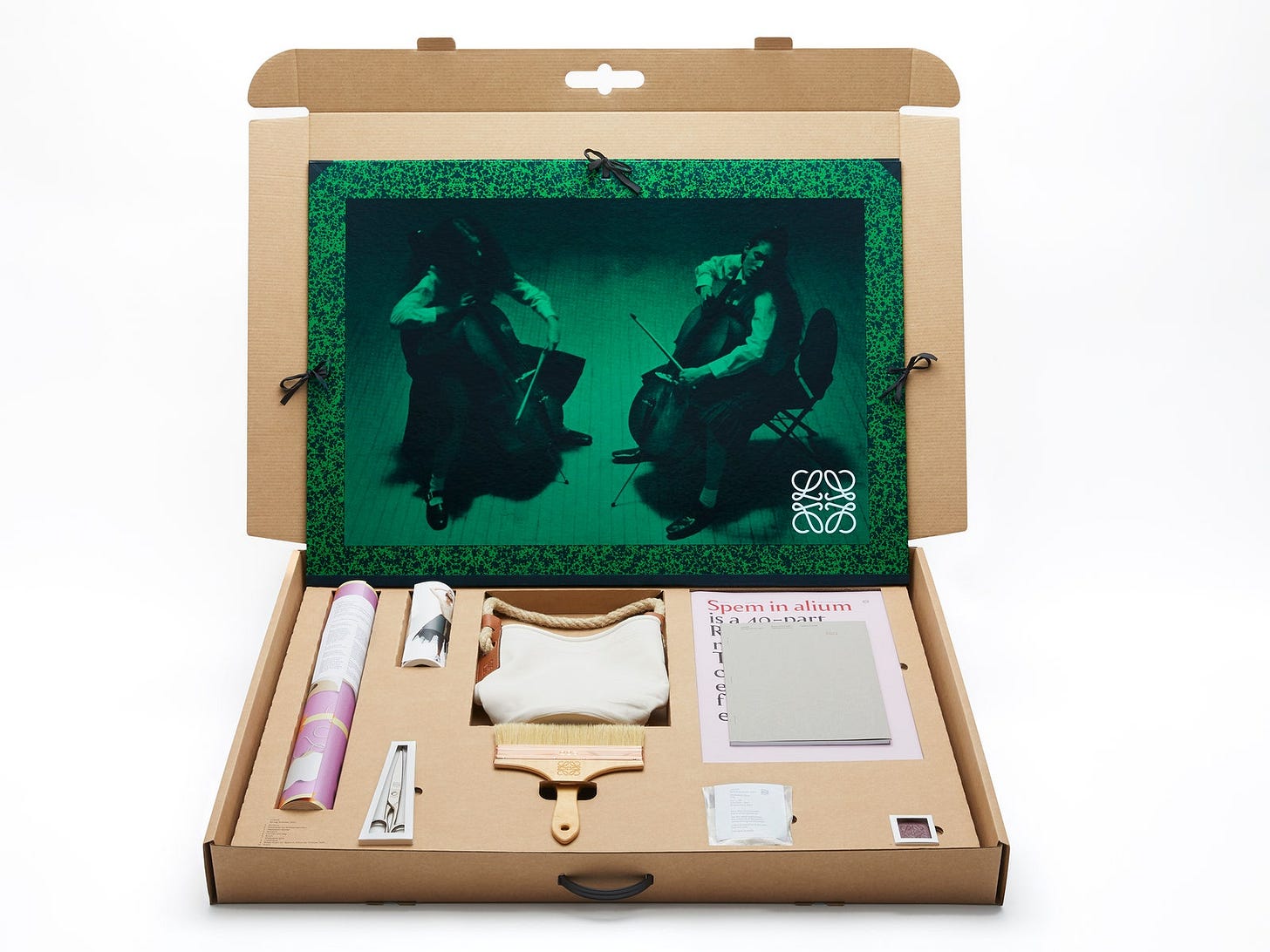Loewe Turns a Content-Commerce Page With A Show in the News
Plus: China’s “National Mom," C-Beauty takes on gender narratives, and a surge of Chinese Clubhouse clones.
Published three times per week, the Content Commerce Insider newsletter highlights how brands create content to drive revenue, globally. If you have received our newsletter from a friend or colleague, we hope you will subscribe as well and follow us on LinkedIn and Instagram.
Perhaps more than any other luxury brand, over the past year Madrid-based, LVMH-owned Loewe -- led by its prolific creative director, Jonathan Anderson -- has recast the Covid-19 pandemic as an opportunity to re-evaluate the traditional relationship between brand and consumer. While peers have largely rushed a new normal that is very much like the old normal — with the likes of Louis Vuitton holding physical runway shows last summer — Loewe has sought to build a more timely and intimate connection with customers and media alike by turning to livestreamed events as well as “shows” designed to be explored and enjoyed by those kept at home by extended lockdowns.
First employed last July in the company’s “Show in a Box,” a collaboration with the Paris-based design agency M/M that debuted the Spring/Summer 2021 men’s collection, Loewe next employed the “at-home runway” concept through its “Show on the Wall” in October. (Which included such items as full-sized posters of the women’s S/S 2021 collection, sheet music for Thomas Tallis’s 1570 choral work Spem in alium, a roll of wallpaper created by artist Anthea Hamilton, and wallpaper glue, scissors, and a paintbrush with which to hang said wallpaper.)
Most recently, with Loewe unable to hold its planned F/W 2021 women’s runway show in Paris, the brand released “A Show in the News,” a clear distillation of the content-commerce concept contained in a small metal box emblazoned with the brand name and the date of the release, March 5, 2021.
Presented in the form of a full-size, 64-page newspaper boldly announcing that “The Loewe show has been cancelled,” “A Show in the News” debuted the new collection (modeled by Danish model Freja Beha Erichsen and photographed by frequent Loewe collaborator Fumiko Imano), included an excerpt from the newest Danielle Steel novel “The Affair,” and outlined creative director Anderson’s many inspirations for F/W 2021. (Noting, in one passage, how “fashion is about a moment in time, inherently connected to a daily newspaper, which serves as a record of the ‘now.’”
The newspaper was complemented by inserts promoting the collection in “real” publications like France’s Le Figaro and Le Monde, Spain’s El Mundo, The New York Times, The Times of London, and Japan’s Asahi Shimbun. In addition, the box included a Loewe-branded bone folder, with which readers were invited to assemble an included excerpt of The Affair, as well as a leather mat with a mounted limited-edition woodblock print inspired by a passage from Steel’s novel.
Despite lacking the typical path-to-purchase embedded in most successful examples of content-commerce (the collection will not be released until this coming August, after all) “A Show in the News” is nevertheless a flawlessly executed example of the format, and one that will play as well in China as it will in Europe or North America. Unlike the virtual content-commerce that has become a staple of the luxury business in the past year (which has seen most brands simply roll out livestreams with links to buy via e-commerce), Loewe’s latest “show” merges the two- and three-dimensional.
Recipients of the box are invited to peruse the newspaper and explore the new collection while interacting with the brand via tactile objects like the Loewe and “The Affair”-branded bone folder and included leather sheath plus the soft, logo-stamped leather mat (a nod to the brand’s deep roots in leathergoods). As was the case with the recent “Show on the Wall,” “A Show in the News” attracted headlines and interest in China, powered by a select few influencers who received the box and showed it off on platforms like Xiaohongshu.
- by Avery Booker
Mentioned in today’s newsletter: Bytedance, Clubhouse, Duihuaba, Inke, Kankan, Kuaishou, LVMH, Loewe, Netease Music, Proya, Tmall, Weibo, Xiaohongshu, Xiaomi.
February Celebrity Spotlight: Zhang Xiaofei Becomes China’s “National Mom”
Celebrities and influencers play an outsize role in China’s social media and marketing scenes, and are an essential part of how brands reach consumers. In this monthly series by CCI for Dao Insights, we take a look at who’s been having the biggest impact and why it matters.
March 8 was International Women’s Day, and the United States marks the full month of March as Women’s History Month. In China, women in the film industry got a head start in making history in February, with comedian Jia Ling’s “Hi, Mom” (你好,李焕英) hitting a number of milestones.
“Hi, Mom” was the first female-directed film to win a coveted Spring Festival release slot. The first day of the Lunar New Year (February 11 in 2021) is traditionally the busiest day for the Chinese box office and reserved for domestic tentpoles, with at least half a dozen big-budget movies debuting on the same day. With a touchingly humorous storyline that revolves around a woman who goes back in time to find a better husband for her deceased mother, “Hi, Mom” held its own against the competition.
During the highly competitive Spring Festival holiday week, it came in second only to the long-anticipated comedy blockbuster “Detective Chinatown 3” (唐人街探案 3), which was held over from a planned 2020 Spring Festival release due to the coronavirus pandemic. And in the weeks following the holiday, positive word-of-mouth reviews and social media buzz have helped “Hi, Mom” to pull ahead and take the top spot as the biggest release of 2021 to date. It now ranks as the second-highest-grossing film of all time at the Chinese box office, with more 100 million views in theaters (only the fourth movie to surpass that figure).
“Hi, Mom” is also the first Spring Festival film to feature two women in the lead roles, along with a decidedly female-focused plot, both rarities on the big screen in China. And while Jia Ling, who plays the time-travelling daughter, has long been a household name as a comedian, the breakout star of “Hi, Mom” was Zhang Xiaofei, the actress who plays the younger version of the title character. Her down-to-earth portrayal of a young woman in the early 1980s won over audiences, who have since taken to giving Zhang the nickname of “national mom.”
Read the full story on Dao Insights.
Brand Film Pick: Proya’s Challenge to Gender Narratives for Women’s Day
Rather than focusing primarily on promoting its products for International Women’s Day on March 8, C-beauty brand Proya made its social stance the centerpiece of this year’s campaign, partnering with China Women’s Daily, the publication of the All-China Women’s Federation, on a much-discussed video that takes a serious look at gender stereotypes.
In the video, rapper Yu Zhen faces the camera, clad in a shirt that reads, “It’s gender, not border!’ in English, as she offers a scathing and clear-eyed indictment of how both women and men are judged against prevailing expectations that privilege masculinity while treating feminization as a derogatory term, and the damage that does to all.
The campaign is striking considering the involvement of a state-run agency, since Beijing has in recent years turned to promoting more traditional gender roles, including a new proposal from the Ministry of Education to emphasize “masculinity” through physical education in schools. But the reality is that young Chinese have grown far more accepting of diversity and the subversion of norms, as seen by the success of the campaign, which has drawn 120 million views for its Weibo hashtag, “gender is not a boundary, prejudice is.”
Of course, given that Women’s Day has become another occasion for a shopping festival in China, thanks to e-commerce promotions, Proya also released a gift box via Tmall that included its Double Anti Essence, artwork by cutting-edge illustrators, and the slogan t-shirt seen on Yu in its campaign video.
News From China: The Clubhouse Conundrum
Who will win at creating a Clubhouse for China? And what will it look like? It’s been a month since the invite-only chat app Clubhouse was blocked in China, after a very, very brief period of flourishing discourse and excitement among Chinese users.
Now, the race is on to create a viable replacement that can work within the confines of Chinese censorship. Who knows if that will be possible, but it’s not stopping domestic tech players big and small from rushing in to try — by some estimates, more than a dozen companies so far have products out, and more than 100 others are on the way.
TikTok parent Bytedance is the biggest company so far to be reported to have a Clubhouse clone in the works, according to Reuters, but sources said that its plans are still in the “early stages.”
Rival Kuaishou may be trying to gain an early advantage in the audio space with its “Spaceship” app, which has already been released and is operating in a small-scale, invite-only beta version. Kuaishou held a music-focused “Private Circle Spaceship Party” on March 6 featuring independent artists and creators, but the goings-on at Kuaishou seems to be a sensitive topic, as many reports about Spaceship have gone missing from the news websites that published them.
On February 19, mobile phone maker Xiaomi closed its instant messaging app MiTalk, then revived it a week later as an invited-only audio platform designed for professionals. Netease Music has also joined the fray by adding an audio chat feature called Kankan to its app that allows users to create chat rooms by topic and invite other users to the conversation.
Some have already run into issues. Livestreaming platform Inke released Duihuaba (“Talk Bar”) on February 12 — with a turnaround time of just six days — but it was removed from app stores less than two weeks later, with the company citing the need for “further improvements” (likely code for running afoul of authorities). And Lizhi, China’s second-largest podcasting platform, opted to skip its home market altogether and operate its Tiya chat app overseas instead.
Participation in a freewheeling audio chat sector in China is likely to be burdensome for both platforms and users — the former will be required to deploy more content moderators (paired with AI-powered listening tools), while the latter will have to remain ever mindful of their speech with the awareness that it is being monitored.
That raises the question of whether Clubhouse’s allure to Chinese users was its basic value proposition (which is not entirely new), FOMO over the new, new thing (especially in the wake of Elon Musk’s surprise appearance on the platform in late January), or the sense of freedom that came with being able to discuss normally taboo subjects such as Xinjiang and Taiwan.
Internet analyst Ge Jia told the SCMP that China may have already leapfrogged past the audio chat model: “China’s social networking is more convenient and advanced than the United States, so we may not need such a product anymore.” But with so many contending to create a Clubhouse for China, the copycats may end up innovating to meet other needs along the way.
News in English
Will South Korean content make a comeback? Nearly five years after geopolitical tensions between the two countries resulted in a de facto ban on South Korean entertainment in China, a strategic partnership between state broadcasters CCTV and KBS is raising hopes for a shift. Variety
Fans of traditional fashion known as hanfu nearly doubled between 2019 and 2020, as more young consumers look to China’s past for style inspiration. Vogue
Hit series takes Chinese-style e-commerce way back in time: iQiyi’s time-travel drama “My Heroic Husband” injects numerous references to modern-day business practices into its storyline. Week in China
An in-depth review of Lunar New Year WeChat campaigns from five global fashion and luxury brands. ChatLabs
Why direct-to-consumer sales represent the future for e-commerce growth in China. LinkedIn
Chinese supermodel Liu Wen is part of Barbie’s latest “Shero” collection, with an outfit inspired by the gown she wore to the Met Gala in 2014. Dao Insights
University students are pushing back against China’s March 7 “Girls’ Day,” which they say perpetuates gender stereotypes and, in some cases, sexual harassment. Sixth Tone
We’ve Got China Covered
China Film Insider: China’s TikTok Is Banning Users Who Brag About Their Wealth
Jing Daily: Lingerie Brand Neiwai Takes Bold Stance on Body Diversity
Jing Culture & Commerce: How Smartify Is Reshaping the Museum Visit — Onsite, Online, and on Mobile







